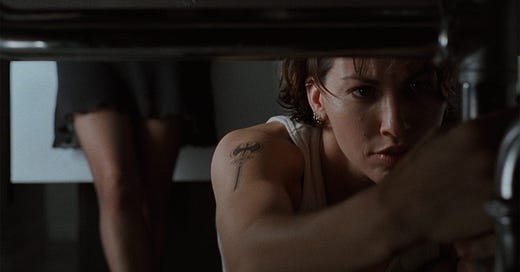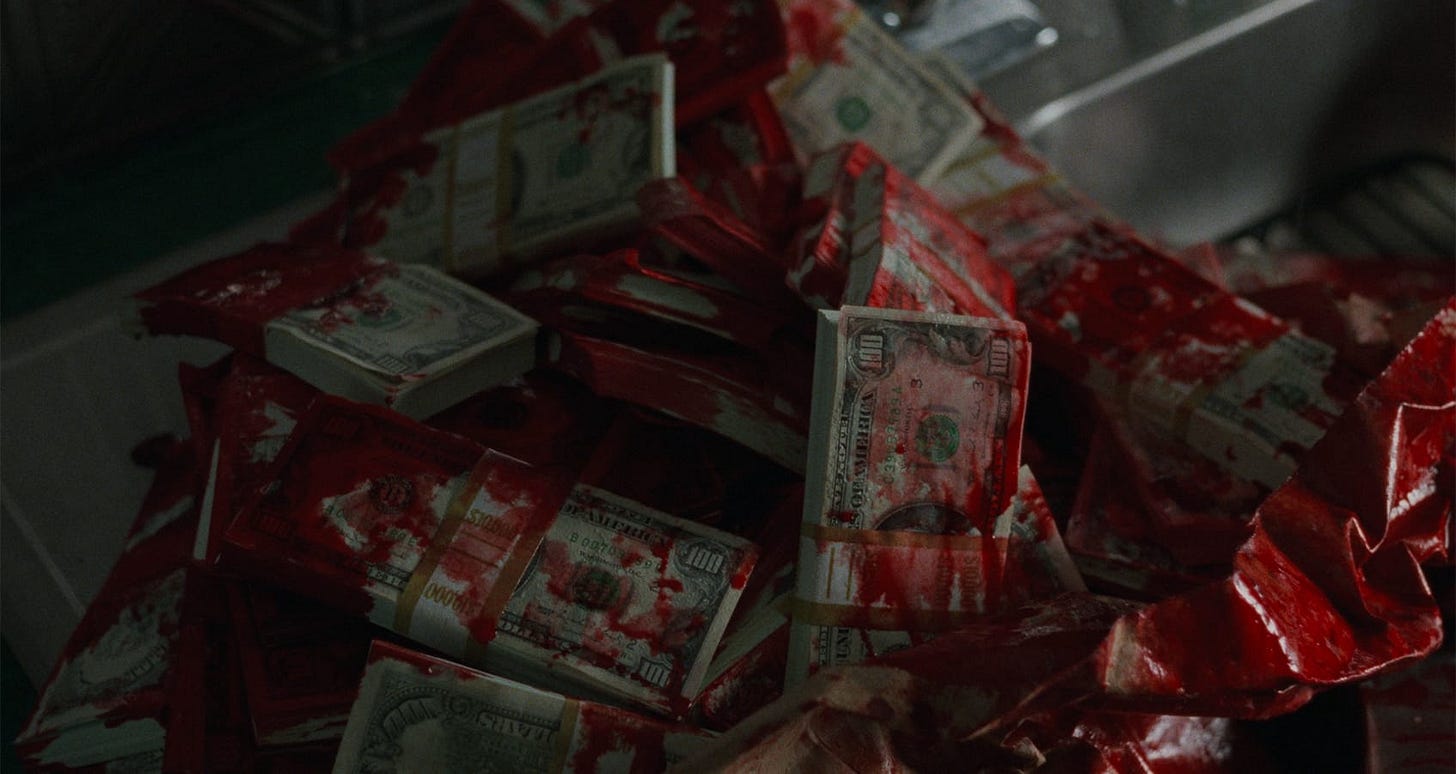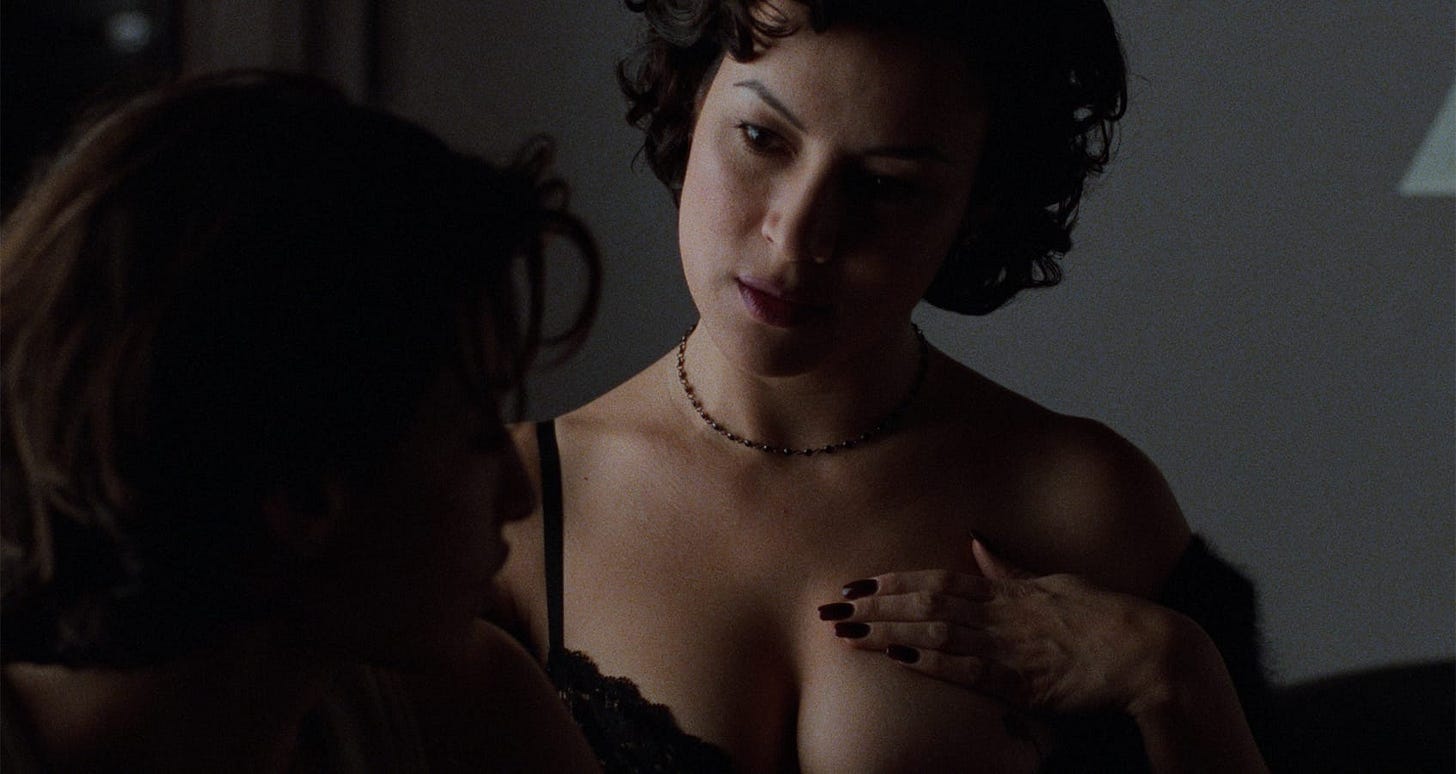Lesbian cheek: How the Wachowskis became attached to "Bound"
[Published in 1996; present-day names are used in this article.]
If you were to come across a hot and humid movie that could fairly be described as a cross between the work of pulp purist James M. Cain and lesbian sexpert Susie Bright, you might be reluctant to believe it was written and directed by a pair of taciturn, married siblings who write and live in East Rogers Park. But Lana Wachowski, 31, and Lilly Wachowski, 28, are the devious minds behind Bound, a sultry slice of noir gamesmanship that boasts clever twists, crackling flirtations, smart, assertive camerawork, and a believable, sensual sexual relationship between two women.
Instead of Cain's grease monkey outsider coming into a dead-as-a-doornail domicile and being taken for a ride by a underhanded femme fatale, the outsider here is Corky (Gina Gershon), a lipstick-butch handyman who catches the eye of dolled-up Violet (Jennifer Tilly), moll of five years to goombah gangster Joe Pantoliano. There are design feats in the Wachowskis' comic chamber drama that impress throughout, but it's the glow on Gershon's lips, the sultry that's the grandest accomplishment; hot enough, Gershon says, to have lesbian audiences treating her like "the dyke Elvis."
After their experience with the script of Assassins, a film they were not allowed to take their name off of, they wanted to direct their own work. Bound was the script they turned out. So why lesbians?
"Um," Lana says.
"Ah," the younger Lilly adds.
After an exchange of glances, Lana says, "Much of the movie is about surfaces and realities under surfaces. The main idea, the starting point for us, was that we would see this character that you would make a host of sexual assumptions about that would all be wrong."
Despite what some writers have already said, implied or outright, this film just wouldn't work if it were about a man and a woman. "That's almost the same question that was asked by some of the major studios that we brought the script to," Lana says. "'If you change Corky to a man, you've got a deal."
Lana continues without a pause, "But then all the subtext is gone, the themes are gone, the dialogue is pointless... People can say that it would be similar, but we're playing with conventions. Why do we have conventions and what are they? Everyone who sees the movie sort of understands the film noir genre, so we started playing with expectations and assumptions. That's what the fun of the movie is for us. We said we didn't want to make that other movie; it had been done already."
The butch/femme aspect is very much yin-yang, two parts create a whole.
We wanted the women to have elements of both sides.
Veteran producer Dino De Laurentiis had bought Assassins from the Wachowskis for "not very much money" and asked to see their next script. "You have to hand it to Dino. He's made a long career on taking chances," says Lana.
Lilly takes on the gruff accent of the seventy-seven-year-old De Laurentiis, "Now what you working on?"
Lana says, "He's this old Italian guy, can we just come out and tell him it's about lesbians? So we're hemming and hawing and like, well, it's sorta about this woman and this other woman..."
"Dino is like, 'The first woman, she is a lesbian? And the other woman, she also is a lesbian! We have a deal!'"
But the process of casting took them aback. Lilly says, "It was amazing. We thought we would write a really hard-boiled script for women. Usually men get these kinds of roles, and we thought we would have women lining up around the block to be in it. But that was not the case.
"I guess they would get to the sex scene and flip! It would go flying out the window. What matters is that pretty much, they're the same woman,” Lilly says. “The butch/femme aspect is very much yin-yang, two parts create a whole. We wanted the women to have elements of both sides."
Before making films, they had both dropped out of college. Their carpentry business was hard work, so they moved on to writing Marvel comics, including some Clive Barker titles.
"We needed to find an easier job. We read Roger Corman's autobiography. We were inspired by it," Lana says. "We said, 'Let's make a low-budget horror movie.' We showed it to some agents who asked us to write something more commercial. So we wrote Assassins. Originally, it was like Bound, it was dark, it was funny, full of weird metaphors. The main character is trapped in this unwinnable chess game. I tried to explain this to Richard Donner, and he said, 'That's subtext! I don't care about that!'"
Lilly says, "The story was about eating the rich, and the consensus around Hollywood was, 'Hey! We're the rich! Do you have anything else?'"
How about the influence of Susie Bright? "We didn't really know Susie until after we wrote the script. But we had read her books and thought they were funny," Lana says. "One of the lines that was really important to the idea of the script was this line she wrote, talking about lesbians, 'We also have stiff, incessant, probing sexual organs. We just call them hands.' We were like, 'Yeah! We'll eroticize hands.' When we finished the script, we sent it to her. She really liked it. That meant a lot to us."
A pause. Lilly says, "The opinion of women we know always does.”





